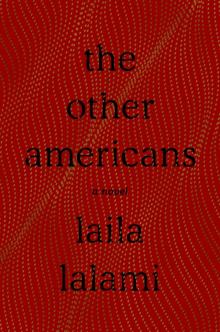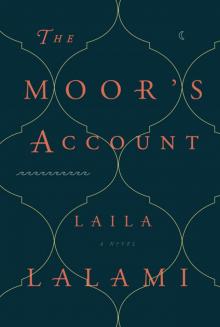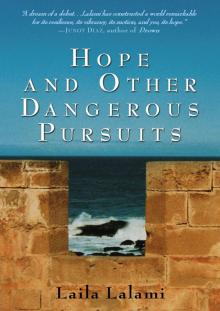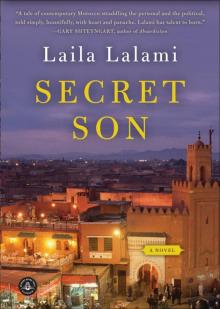- Home
- Laila Lalami
The Other Americans Page 2
The Other Americans Read online
Page 2
Vasco must have been in a rush because he left the conference room without commenting about my tardiness. Must be my lucky day, I thought. My shift was pretty quiet, too: a noise disturbance; a parked vehicle check; a dropped 911 call that turned out to be a butt dial; Marci Jamison once again trying to report her Ativan and Percocet stolen so she could get a replacement prescription. As I changed out of my uniform at the end of the day, I found myself making a mental list of everything I still had to do that night. Read for my ethnic studies class. Go over my history text to prepare for my final. Turn in my English paper by email. On my way out of the station, I walked past the dry-erase board where active cases were listed. One name made me stop. Guerraoui.
Efraín
I saw it happen. I wish I hadn’t, because it only brought me trouble. And I really wish I hadn’t told Marisela about it. That night, I was riding my bicycle on the 62, heading home after work, when the chain fell off my back gear. We used to have a car when we lived in Arizona, a Toyota Corolla we bought for $875 from one of the ushers at our church, but it broke down after we moved here and we couldn’t afford to repair it or buy another one. We lost $875, just like that. Sometimes, Marisela complains that people come to this country to get ahead, and all we’re doing is getting behind. I’m doing the best I can, I tell her, I can’t do more than that. What I don’t tell her is that we’d get ahead if we didn’t have her two sisters in Torreón to support. And the bicycle isn’t so bad—I got it for free from Enrique, and I can ride it almost anywhere. The only problem is the chain.
That’s what happened that night. I had to stop when the chain fell off. I pulled up to the sidewalk, not far from where the 62 meets Chemehuevi Way, and turned the bicycle upside down. Getting a chain back on its gear is easy enough, but it was dark and I’m farsighted, so I couldn’t see what I was doing. I don’t usually carry my glasses with me because I don’t need them, not for the carpet-cleaning service I work for during the day, or for washing linens at the motel in the evening. I got down on my knees and started draping the chain by feel, getting it back on the gear one link at a time. It took a while, and when I finally got it done, my hands were dirty. I raised myself up carefully, trying not to get any grease on my pants, holding my arms away from me, as if I were groping for something in the dark. That’s when I heard a car speeding toward the intersection and then a dull sound. Bump. Like that. I looked up, and the car was already making a turn onto the side street. The old man rolled off the hood and landed facedown in the gutter. And the car didn’t even stop. It went on as if it had only hit a can or a plastic bottle.
“You should call the police,” Marisela said.
I walked past her to the kitchen sink and squeezed dish soap on my hands, trying to work the grease off. “Did you forget what happened to Araceli?” I said. Araceli lived down the street from us in Tucson. A plump woman with big hair and a cackling laugh. She called the police to report a neighbor who was beating his wife, and when they came to take her statement, they found out she didn’t have her papers. Before she knew what was happening to her, Immigration was at her door. California is different from Arizona, at least that’s what people say, the laws are different here. But how could I take a chance like that?
“So you just left?” Marisela said, her hand on her cheek. In the bright light of our kitchen, the freckles across the bridge of her nose looked darker. Twelve years we’ve been married, and those freckles still get me. I couldn’t lie to her. I looked away, kept scrubbing my hands. She came closer, and when she spoke again her voice rose with astonishment. “You left him there?”
Well, no. Not exactly. I pulled out my phone from my pocket, getting grease all over the keypad before I realized that the call could be traced. So I looked at the buildings on that stretch of the 62, trying to decide where I could go for help. There was a diner with a bright sign, but all the lights inside were off, except for the one that flashed CLOSED in red and blue. The bowling arcade next door was open late, though, and I started down the pavement, until I noticed a jogger coming up to the intersection. A woman in running shorts, her blond hair in a ponytail, her ears covered by headphones. She couldn’t have heard anything, but she was about to cross the highway at Chemehuevi. She would find the old man on the other side and she would call the police. I got on my bike and went home. “So you didn’t help him?” Marisela asked.
“There wasn’t anything I could do,” I said, wiping my hands with a paper towel. Traces of grease still stuck underneath my fingernails. I walked past her to the bedroom, where I took off my uniform. The children were asleep in the bed under the window, and I moved quietly so that I wouldn’t rouse them. Elena was eight at the time, and Daniel was six. Both citizens, I want to be clear about that. Everything I did was for them. Or didn’t do, you might say.
I picked up a fresh towel from the pile on the bed, and stepped into the bathroom for a shower. The water was warm and I closed my eyes, but the first image that came to me was of the old man, his face sunken against the gutter, one of his knees twisted beneath the other at a peculiar angle, an arm tucked under his chest as if to support his weight. I saw new details, now that my eyes were closed, things I hadn’t noticed in the shock of the moment. On the electric pole behind the man was an advertisement, printed on yellow paper and pinned at eye level. Five feet below that notice, the old man’s hair was a shock of white, and the bright green of his shirt stood out against the gray asphalt.
I opened my eyes under the water. No, I told myself, I hadn’t witnessed the accident. What I had really seen was a man falling to the ground and a white car speeding away in the night, and I wasn’t even sure about the color. It could be white, or maybe it was silver. But I really didn’t know what make or model it was, and I didn’t catch the license plate number. So you see, there wasn’t anything I could do. All I saw was a man falling to the ground.
Nora
I took a shower, wiped the steam from the mirror, and in the damp glass I saw that I looked different. Expectant. I couldn’t quite believe that life would go on now without my father, that by the next morning the sun would rise, my mother would sit at the kitchen table, the cat would nibble at its food, the neighbor would lean on her walker as she made her way down the street. The last time I had been home was for Thanksgiving. Only five months had passed and yet I couldn’t remember much about that visit. There had been a board game or two after the big meal, a movie at Cinema 6, a hike with my father at the national park in Joshua Tree, but I couldn’t recall anything particular about those four days. They were just four ordinary days.
It took me a long while to get dressed. I put on a dress, a belt, my watch, but with each item my thoughts would wander before I remembered to button, strap, or clasp, so that by the time I came out of my bedroom, my hair was almost dry. I was crossing the entryway toward the kitchen when the front door flew open. Salma, Tareq, and their twins walked in, the adults carrying grocery bags and the eight-year-olds clutching their tablets. “Aunt Nora,” Zaid called, and ran to hug me, while Aida quietly put her arms around my waist and squeezed.
I held them, surprised, as I still am sometimes, by how much they had grown since I had last seen them. And there were other small changes, too. The psoriasis spots on Aida’s elbows had gotten bigger, I noticed, and Zaid had a temporary Captain America tattoo on the back of his hand. Once, my father and I were watching the kids splash around in the inflatable pool on a warm spring day and he asked me, What is dearer to the heart than a child? I thought about it for a minute, then gave up. What? I asked. A grandchild, he said. Now he would never see his grandchildren again, never build a Lego spaceship with Zaid or teach Aida how to do crossword puzzles.
“When did you get here?” my sister asked, dropping the grocery bags to the floor.
“Early this morning,” I said.
Salma looked startlingly pale, and her polka-dot shirt and black pants were so big on her that I wond
ered if she was ill, but the thought drifted from me as she came closer. The minute we embraced, she began to cry. I found myself comforting her, just as I had comforted my mother earlier that day. Salma’s husband stood beside us, waiting, but as the moment stretched he asked the twins to go to the living room and brought a box of Kleenex from the guest bathroom.
“I’m sorry I had to tell you by text,” Salma said. “You weren’t picking up your cell phone.”
“I was eating dinner,” I said. “I didn’t hear it ring and I didn’t see your text. It was Mom who told me.” The memory still stunned me: while my father lay on the pavement, his life slipping out of him, I’d been out celebrating with Margo.
“Did you get the coffee?” my mother asked. She was standing in the doorway. Her eyes were small and her cheeks webbed with pink veins.
“Yes, Mama,” Salma said.
I picked up one of the paper bags and followed my mother and sister into the kitchen. On the wall above the spice rack was a framed collage of black beans in the shape of a tree, which I’d made in the second grade. Each branch was labeled with a name. Daddy. Mommy. Salma. Nora. I was the last bough on the right. On the stainless-steel refrigerator were half a dozen pictures of Salma’s twins and a magnetic dry-erase calendar with no appointments marked on it. From the little desk by the window, where bills and magazines were stacked, Tareq pulled out a piece of paper and a black marker. “What are you writing?” Salma asked him.
“A sign for the diner.” He held it up. “We can tape it to the door.” In block letters, he had written THE PANTRY IS CLOSED DUE TO A DEATH IN THE FAMLY.
“You’re missing the i,” I said.
Tareq turned the paper around so he could see for himself. “It’s just a sign,” he said with a shrug. “It doesn’t matter.”
“It matters. Dad wouldn’t like it. He’s very touchy about things like that.” I glanced at my sister. “You remember how he reprinted all the menus because there was a typo in the steak special? He said customers would notice and think his restaurant was run by an idiot.”
“I remember.”
Tareq added a tiny i, barely visible between the m and the l. “There,” he said. “Fixed.” Then he took the restaurant keys and stepped out through the kitchen door. I leaned against the counter and watched my mother. She was scooping coffee grounds, evening out each spoonful before she poured it into the coffeemaker. Her movements were careful and precise, as if a great deal depended on this task. “I’ve been thinking about something,” I said. “The cops said they found him by the gutter on Chemehuevi Way. That means whoever hit him had to swerve all the way to the side of the road to hit him, right?”
“That’s why they think it’s a drunk driver,” Salma said. Often when she spoke to me, she could sound condescending, whether or not that was her intention. She must have realized it this time, though, because she quickly added, “Or it could be one of those Marines rushing to make it to the base at Twentynine Palms on time. They drive like maniacs when they’re late.”
My mother closed the coffeemaker lid with a snap and, with her back turned to me, began folding the grocery paper bags into rectangles, stacking them on the counter. I took that as a signal that I had to stop asking her about the accident. She had already told me all she knew.
In what remained of the afternoon, we worked in silence. From the glass cabinet, we took out cups and saucers for the coffee, and the little blue glasses for the tea. We washed mint leaves and unwrapped the snacks that Salma had brought. Whenever the phone rang, one of us answered it and gave directions to the house. In a little while, Tareq returned from the restaurant and set the keys back on the counter. “Who will take care of bookkeeping?” he asked.
I looked up from the napkins I had been folding. “What bookkeeping?”
“Who’s going to sort out payroll? Handle payments to suppliers? With the diner closed, everything’s going to run a little behind.”
“Are you seriously asking about money at a time like this?”
“Nora,” Salma said, her tone reproachful.
“What? You heard him.”
“These are not unreasonable questions. Not all of us can be like you, with your head in the clouds.”
Your head in the clouds. The idiom rang like an echo in my life. It had started when I was nine or ten, so absorbed in reading my books that I didn’t hear my name when I was called to the dinner table. “You have your head in the clouds,” my mother would say, often with affection. A few years later, when I helped out at the restaurant after school, the remark turned into a bitter reprimand. “You gave out the wrong change. You have your head in the clouds,” my mother complained. And later yet, when I decided against medical school, it became an accusation. “You’re going to ruin your life, benti. You have your head in the clouds!”
Having my head in the clouds was my way of surviving. This realization came to me early, on my first day at Yucca Mesa Elementary, when Mrs. Nielsen cheerfully read the children’s names on the roster, but could not bring herself to say “Nora Zhor Guerraoui.” Twice she started on the middle name and stopped, frowning at the consonant cluster. The class grew silent, united in its curiosity about the word that had made the teacher falter. Then Mrs. Nielsen lowered her reading glasses over her nose and peered at me. “What an unusual name. Where are you from?” At recess, the kids fanned out and gathered again in small groups—military kids, church kids, trailer-park kids, hippie kids—groups in which I knew no one and no one knew me. I stayed behind by the blue wall that bordered the swings, and watched from a distance. In the cafeteria, I ate the zaalouk my mother had put in my lunchbox, while the other girls at my table whispered among themselves. Then Brittany Cutler, a pretty blonde with plaited hair and a toothy smile, turned to me and asked, “What are you eating?”
I looked up, immensely grateful for a chance to finally talk to someone. “Eggplant.”
“It looks like poop.”
The other girls tittered, and for the rest of the day they called me a poop-eater. At story time, we all gathered around Mrs. Nielsen to hear her read from “Rapunzel,” but nobody wanted to sit next to me. Later, Mrs. Nielsen started playing “Twinkle, Twinkle, Little Star” on the xylophone and asked us if we recognized the tune. I said, “It’s the purple and green song!” to which Mrs. Nielsen replied, “No, sweetie, the star twinkles, it’s not purple or green. You really need to learn your colors.” I didn’t know how to tell her that I already knew my colors, that I was talking about how the music looked, the shapes and shades the notes made. So when my father came to pick me up after school, I ran across the blacktop and into his arms as though he were a savior. He dried my tears, took me home, and let me have Oreos before dinner.
But the next day I still had to go to school. I learned the alphabet, learned the pledge of allegiance, learned to stay out of the way of bullies. In class, I was quiet. At lunch, I sat alone. The silence cloaked me with safety, but it betrayed me a few months later, when Mrs. Nielsen became convinced I had a learning disability. She called my mother into the classroom one sunny morning in May and used words like severe mutism, social anxiety, oppositional behavior. The terms failed to elicit a flicker of recognition from my mother. After a moment, Mrs. Nielsen’s voice dropped to a whisper. “There’s something wrong with your daughter,” she said. I sat on a yellow mat in the corner, playing, listening, waiting for my mother to say, “There’s nothing wrong with my daughter.” But she only nodded slowly, as if she agreed with the teacher.
When my father came home that night and found out what had happened, he said the teacher was a fool. “Hmara,” he called her, a word he reserved for the television anchors with whom he argued during the eight o’clock news. Then he reached into the fridge for a beer and started sorting through the bills on the kitchen counter. I watched my mother’s face for a reaction. It was immediate. “And you know more than the teacher?”
“I know more about my daughter.”
“Salma didn’t have this problem in kindergarten. She was first in class, always.”
“There is no problem, Maryam.”
“If she doesn’t speak, she has to repeat the year. That’s what the teacher said.”
“No, she doesn’t.” He ruffled my hair. “Nor-eini, try to speak in class, okay?”
But the teacher’s threat, relayed and amplified by my mother, was indelible in my mind. Not speaking meant that I would have to repeat, and repeating meant that I wouldn’t have to see Brittany Cutler or her acolytes every day. So I stayed in kindergarten another year. I learned the alphabet again and the pledge of allegiance again, though this time there was Sonya Mukherjee, a girl who was just as quiet as me, a girl who didn’t fit in with the others, either. By the time I started the first grade, I had one friend.
Still, it wasn’t until middle school that I fell in with my own tribe—music nerds. Two summers earlier, having noticed my talk of music and colors, my father had enrolled me in piano classes with Mrs. Winslow, a neighbor who had retired to the desert after years of teaching music at USC. She gave a name to how I saw the world. Synesthesia. And with that word came the realization that there was nothing wrong with me, that I shared this way of experiencing sound with many others, some of them musicians. At the audition for band class, I played Minuet in G, and was immediately given a spot. Sonya, too, earned a place, playing the flute. And there were other good kids in the band. Lily and Jeremy and Manuel and Jamie. Kids whose first instinct wasn’t to ask “What are you?” but “What do you play?” Pinned to the wall above the teacher’s desk was a poster that asked: DID YOU PRACTICE YESTERDAY? ARE YOU PRACTICING TODAY? WILL YOU PRACTICE TOMORROW? The strict discipline and long rehearsals he imposed on us bound us together. And I didn’t even have to talk much—I only had to play.

 The Other Americans
The Other Americans The Moor's Account
The Moor's Account Hope & Other Dangerous Pursuits
Hope & Other Dangerous Pursuits Secret Son
Secret Son